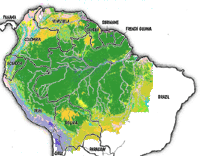Natural Options for Your Garden
If you were born in the last 50 years, it may be hard to imagine food produced completely without the use of pesticides. In fact, it is tempting to think that these insect and weed eliminators are a necessary part of creating those big, bountiful berries, or luscious, leafy greens.
However, while farmers have been using chemicals found in their environment for thousands of years to control pests — the Greeks and Romans used such materials as ashes and sulfur — man-made pesticides have only been used widely in modern agriculture since the 1940s.
Man-made pesticides may keep pests out of your garden, but they also offer two major environmental problems:
- They are harmful to our water. When rains come, they are washed into nearby rivers and lakes. Our water treatment systems are not designed to remove pesticides.
- Pesticides are not species-specific. Depending on the type, they can be toxic to all species (including humans), and may be harming predatory species that could have helped eliminate your pests in the first place.
One way to help prevent this is to properly dispose of your leftover pesticides. You can find a drop-off location for pesticides using Earth911.
Another option is to consider farming without the use of pesticides. Here are a few tips:
Maintain Healthy Plants
Young and sickly plants are most susceptible to a pest infestation, and unwanted insects are often a harbinger of an unhealthy plant and less than ideal growing conditions. By keeping soil healthy through crop rotation, sufficient space and ventilation, and the use of such natural fertilizers as organic compost, a healthy environment for plants can easily be maintained.
Crop Rotation
Often, pests will feed on one type of plant but not on another. Growing different types of plants in the same space breaks the lifecycle of these types of pests. It will also keep your soil fertile because growing the same crop throughout will deplete your soil of specific nutrients.
Symbiotic Plants and Animals
Mutually beneficial flowers and herbs (such as chrysanthemums) act as natural pest repellents when planted among other flowers and crops.
In addition, the introduction of certain types of insects is another effective form of pest control. For example, the introduction of ladybugs effectively controls aphid populations.
Physical Barriers
Whether in your home or garden, pests need a point of entry. Eliminating this opportunity will discourage pests from making their home in yours.
Biopesticides
These deterrents are naturally occurring and can be made from animals, plants, bacteria and minerals. However, precautions should still be used with these types of pesticides.
Properly Dispose of Yard Waste
Yard and grass clippings can reach our local waterways by washing into storm drains. Keep green waste out of storm drains. Try grasscycling, composting or participating in your local green waste program.
Grasscycling is the practice of leaving clippings on the lawn when mowing. The clippings quickly decompose, returning nutrients to the soil. Some grasscycling benefits:
- It makes caring for your lawn easier, and will not cause thatch
- You can reduce mowing time by as much as 50 percent
- Leaving clippings on the lawn also reduces the lawn’s water loss and need for fertilizer.
To grasscycle, it is best to cut grass when the surface is dry (no drops of moisture on the grass), and to keep mower blades sharp. Follow the “1/3 rule”: Mow the lawn often enough so that no more than 1/3 of the length of the grass blade is removed in any one mowing.
Proper mowing will produce short clippings that will not cover up the grass surface. You may have to cut the lawn more frequently, or double cut, when the lawn is growing quickly.
Backyard composting is the process of allowing nature to break down your green waste. When you mix your grass clippings, weeds, trimmings and water in a bin, beneficial insects and microorganisms decompose the mixture into finished compost.
You may have finished compost in as early as six weeks. Finished compost can be placed over the soil as mulch, or mixed into the soil as a wonderful soil amendment.

